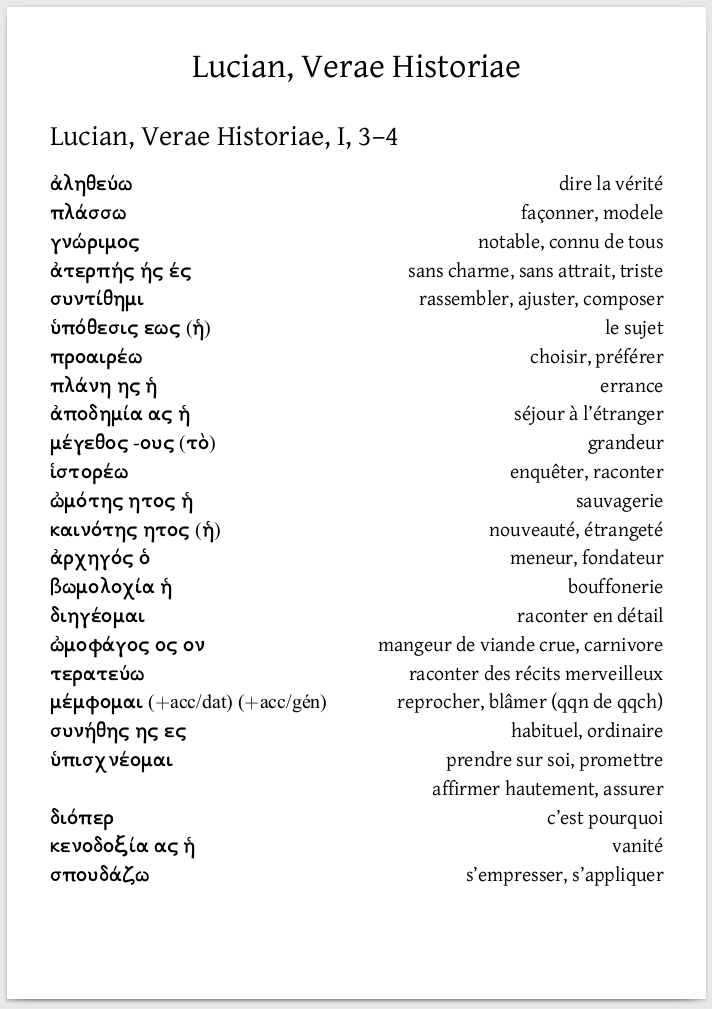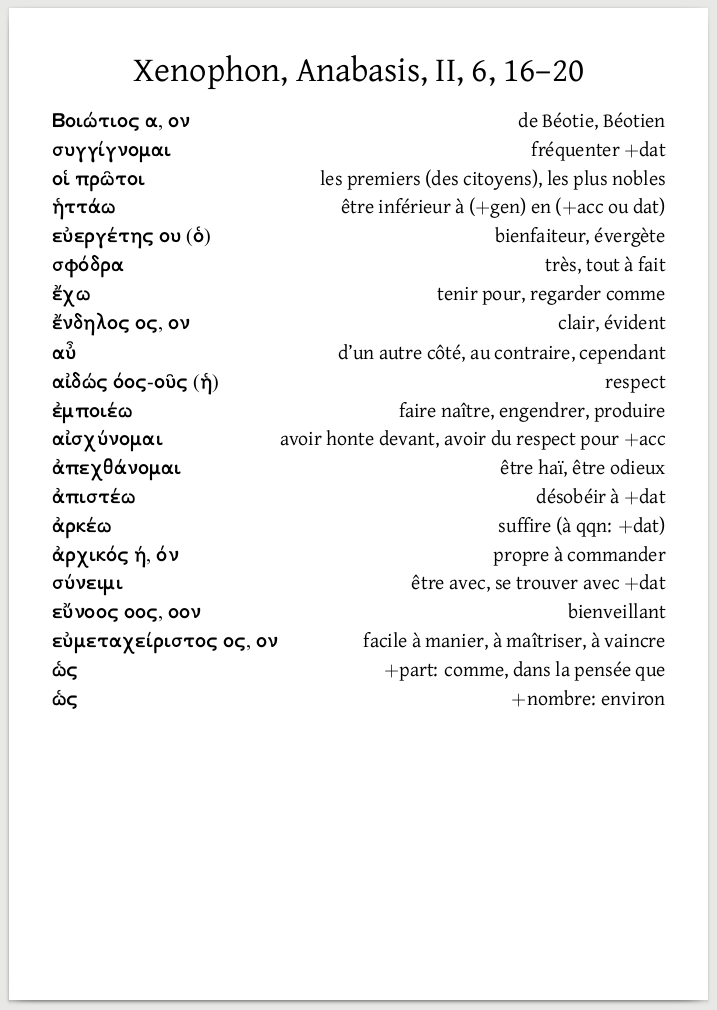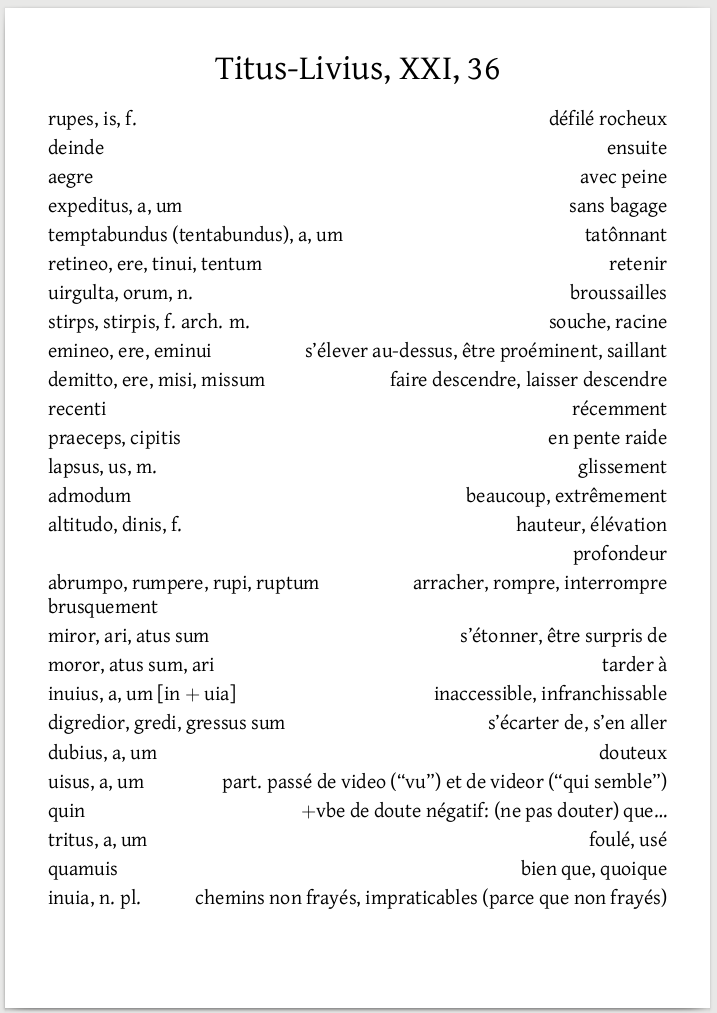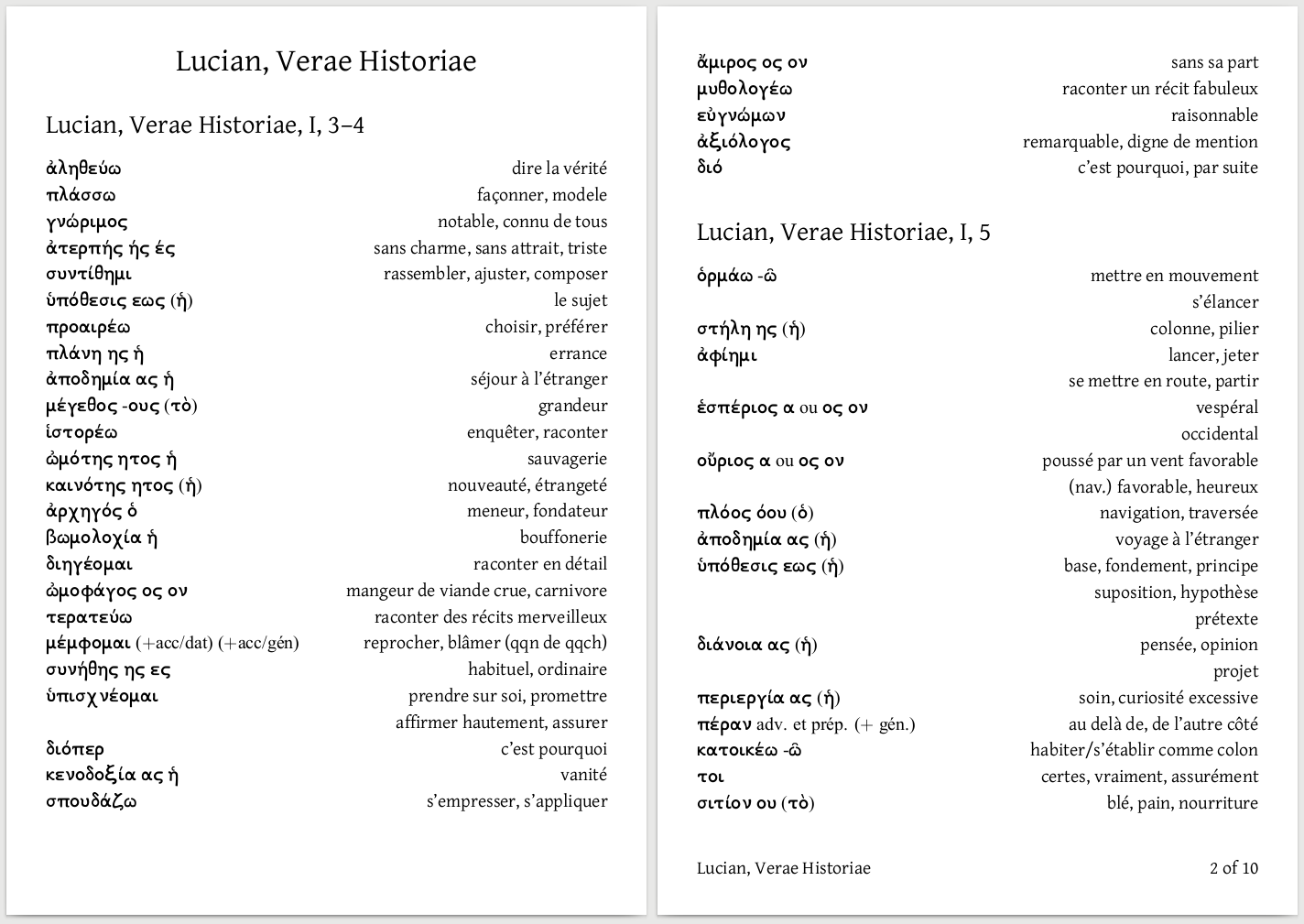Cette page n'est disponible qu'en anglais !
Vocabulary list creator script
Make semi-automatic word lists to study a text in a foreign language. Examples:
download code view github repo
On this page:
Introduction
When studying a foreign language, it is useful to learn vocabulary in context: I used to make vocabulary lists to record unknown words for each text I studied, so when I revised the vocabulary list I was able to remember both the word and the context.
I designed a workflow and a series of scripts to build in a semi-automatic way to build vocabulary lists from raw texts. Here is the workflow:
- copy the text in Microsoft Word or LibreOffice Writer, read the text and underline unkown words,
- extract the underlined words, with a script which will also get their lemmas (that is, the form under which they are recorded in the dictionary, for example
cats -> cat); clean this list (remove unwanted lemmas, add some more, etc.), - extract dictionary definitions, again with a script and clean them (choose between various meanings, remove or adde examples, etc.),
- transform the list to a
.texfile, again with a script, and make a pdf out of it.
You get, for example, for Ancient Greek (2 pages are presented side by side):
Complete example of the workflow
I will use Ancient Greek as an example, but the workflow can be adapted to other languages (I have used it for Latin, English, German). You will need some knownledge of the command line, but it should work on Mac OS, Linux and Windows (with Cygwin).
The first step is to copy the text you want to study in Microsoft Word or LibreOffice Writer, read it and underline the unknown words. Here is an example from Xenophon's Anabasis:
Save the text in the .odt format (even with Microsoft Word), because this is an open source format that can be read by non-proprietary programs. Let's say you have saved it under the name xenophon_anabasis.odt.
Run the following command to extract the words and get the lemmas (or lemmata). Lemmas are searched by requiring pages from the Perseus website:
python3 extract_words.py xenophon_anabasis.odt | \
perl getlemmata.pl -i /dev/stdin -o xenophon_anabasis.listYou will get a xenophon_anabasis.list file, containing the lemmas. Open it with a text editor (Gedit, Text Editor, Notepad, etc.):
# The lemmata found on Perseus are:
# for word βοιωτιος:
Βοιώτιος
# for word συνεγενετο:
συγγίγνομαι
# for word πρωτοις:
πρότερος
πρῶτος
πρωτός
# for word ηττασθαι:
ἡσσάομαι
# for word ευεργετων:
εὐεργέτης
εὐεργετέω
...
(Only the beginning of the file is shown.)
Based on your knowledge of the language and of the text, try to select the correct the correct lemma when there are several choices, because one word form may be related to several lemmas (as in English: "axes" may be the plural of "ax(e)" or of "axis"). Lines starting with a hashtag are ignored. So you may end up with something like:
# The lemmata found on Perseus are:
# for word βοιωτιος:
Βοιώτιος
# for word συνεγενετο:
συγγίγνομαι
# for word πρωτοις:
πρῶτος
# for word ηττασθαι:
#ἡσσάομαι
ἡττάω
# for word ευεργετων:
εὐεργέτης
...
You may also add lemma that have not been found, if you have looked up a word in another dictionary. Save the file, for instance in xenophon_anabasis.list-cleaned. Now run the simdic.pl script to get the definitions from a dictionary you specify with the -d option:
For each word in the cleaned list, dictionary definitions have now been added in the resulting xenophon_anabasis.voc file:
Βοιώτιος α, ον ::de Béotie, Béotien ; (en mauv. part) syn. de lourdaud
::[Βοιωτός]
συγγίγνομαι ::f. συγγενήσομαι, ao.2 συνεγενόμην, etc
::1 naître avec
::2 être ensemble, être avec, avoir des rapports, fréquenter [...]
::3 venir à l’aide de, aider, ÷ dat
::[σύν, γίγνομαι]
πρῶτος η, ον ::premier
::I. (adj.) 1 (dans l’espace) le plus en avant [...]
::2 (avec idée de rang et de nombre) le premier [...]
::II. (subst.) 1 τὸ πρῶτον, τὰ πρῶτα, le commencement
::2 τὰ πρῶτα (ἆθλα) le premier prix ; τὰ πρῶτα λαμβάνειν [...]
::3 τὰ πρῶτα, le plus haut degré, le point le plus élevé [...]
::III. (adv.) 1 fém. πρώτη : τὴν πρώτην, la première fois, [...]
::2 neutre πρῶτον, πρῶτα et τὸ πρῶτον, τὰ πρῶτα, [...]
::[p. *πρόατος, Sp. de πρό ; cf. Cp. πρότερος]
ἡττάω ::att. c. ἡσσάω
εὐεργέτης ου (ὁ) ::bienfaiteur, évergète
::[εὖ, ἔργον]
(I've cut the end of the lines to not overload this guide.)
Open the file in your text editor and perform some clean up: choose the right definition (the one that is used in the original text), if there are several, choose the example you want to include, etc. Add a title, and, optionaly, the type greekfont to get a nice greek font (defined in the mklist_text.pl code). You may end up with something like this:
#title:Xenophon, Anabasis, II, 6, 16--20
#type:greekfont
Βοιώτιος α, ον ::de Béotie, Béotien
συγγίγνομαι ::fréquenter +dat
οἱ πρῶτοι ::les premiers (des citoyens), les plus nobles
ἡττάω ::être inférieur à (+gen) en (+acc ou dat)
εὐεργέτης ου (ὁ) ::bienfaiteur, évergète
σφόδρα ::très, tout à fait
ἔχω ::tenir pour, regarder comme
ἔνδηλος ος, ον ::clair, évident
αὖ ::d'un autre côté, au contraire, cependant
αἰδώς όος-οῦς (ἡ) ::respect
ἐμποιέω ::faire naître, engendrer, produire
αἰσχύνομαι ::avoir honte devant, avoir du respect pour +acc
ἀπεχθάνομαι ::être haï, être odieux
...
Save the file under the name xenophon_anabasis.voc-final.
Then use the mklist_text.pl to create a .tex file:
If latexmk is installed, the script will compile you .tex file automatically and you will just end up with a nice pdf file, like this:
The pdf file will be name accordingly to the title of the vocabulary list, for example xenophon_anabasis_ii_6_16-20.pdf in our example.
The page size is A5.
You will find longer samples in Greek and Latin in the samples directory.
In summary:
# underline words with Office or Writer, and save to .odt
python3 extract_words.py xenophon_anabasis.odt | \
perl getlemmata.pl -i /dev/stdin -o xenophon_anabasis.list
# clean the file xenophon_anabasis.list
perl simdic.pl -d /tmp/bailly.dic < xenophon_anabasis.list-cleaned \
> xenophon_anabasis.voc
# clean the file xenophon_anabasis.voc
perl mklist_text.pl xenophon_anabasis.voc-finalThe dictionary files
In order to get the definition with the simdic.pl script, you will need to download and create a dictionary file. It is a simple text file with the following format:
- each entry is on a line, containing:
- the entry word
- a tabulation
- the complete entry, e.g. with the gender, genitive case, etc.
- a tabulation
- the various definitions and examples are separated with the characters
\n(not an actual new line, just the two characters).
This is also the file format use by StarDict and GoldenDict programs. Here is an example:
Α, α Α, α \nἄλφα (τὸ)\nindécl.\n\nalpha :\n 1e lettre de l’alphabet grec [...]
Αἰάκειον Αἰάκειον ου (τὸ) \n\nsanctuaire d’Éaque, à Égine\n\n[Αἴακος]
Αἰάντειος Αἰάντειος ος, ον \n\nd’Ajax\n\n[Αἴας]
Αἰήτας Αἰήτας αο (ὁ) \n\ndor. c. Αἰήτης
Αἰήτης Αἰήτης ου (ὁ) \n\nÆètès :\n 1 roi de Colchide\n 2 autres
Αἰακίδης Αἰακίδης ου (ὁ) \n\nfils, descendant d’Éaque ; οἱ Αἰακῖδαι les Éacides [...]
Αἰαντίδης 1 Αἰαντίδης 1 ου \nadj. m.\n\nde la tribu Æantide\n\n[Αἰαντίς]
...
You can download many dictionary online. The Bailly Abrégé (the one used in this example) can be downloaded here.






